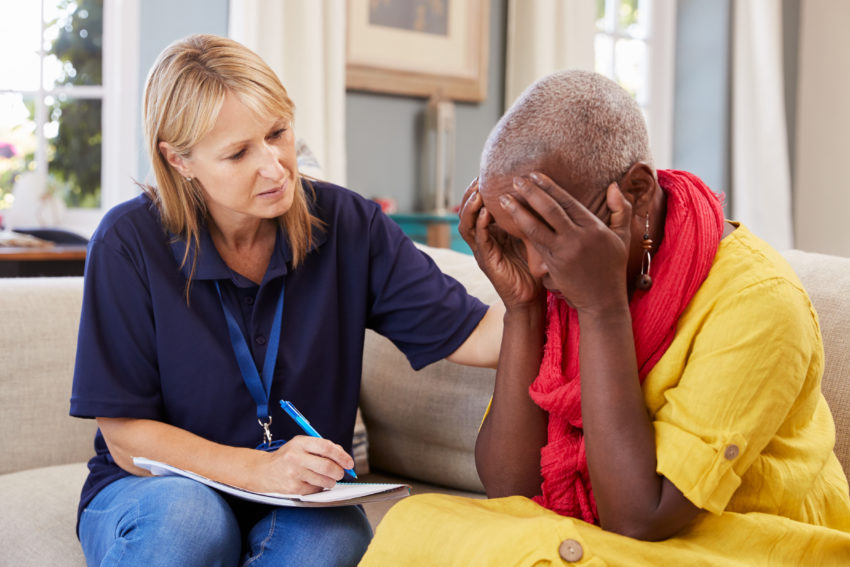Autistic people make up approximately 1% of the population but 11% of suicides, and with estimations that there are over half a million undiagnosed autistic adults in the UK, this percentage may be higher. In this article David Stocks, Suicide Prevention Community Worker at Black Country Healthcare NHS Foundation Trust shares some of his own experiences dealing with mental health services and improvements that can be made to improve care provided for neurodivergent individuals.

The statistics illustrate just how significant the risk of suicide is for Autistic people [1]:
- Autistic adults with no learning Disability are 9x more likely to die by suicide than the general population
- It is the second leading cause of death for autistic people. The average life expectancy for autistic people is 54 years old.
- Up to 66% of autistic adults have considered suicide
- Autistic children are 28X more likely to attempt suicide
- One study showed that 15% of autistic children had suicidal thoughts compared to 0.5% of typically developing children
- In the 86 days leading up to the first lockdown and up to 56 days after, a quarter of young people who died by suicide were autistic or had ADHD.
It’s my personal journey that brought me to the point of writing this article and it emphasises why a different approach is required to support neurodiverse individuals. I first suffered suicidal thoughts about sixteen years ago, it followed a stressful period at work and resulted in my first hospitalisation.
The hospital wasn’t a good place for me, with all the constant noise and lights there. I felt worse and not better. I didn’t understand why I felt this way at the time, just that I couldn’t cope in that environment.
The importance of the right Patient Environment
With autism and neurodiversity, the environment really matters and most hospital wards are unsuitable places for neurodiverse individuals. This was highlighted when I spoke with an autistic person recently, they said being sectioned and the thought of staying in a hospital environment was so disturbing that it would actually lead him to taking his own life.
The environment is important, but what can be done about it?
It’s obvious hospital isn’t the best place for someone from a neurodiverse background, so where possible, home treatment is be a better option more suited to them.
Hospitals can be improved though and some hospitals are distinctly better than others. Here are some simple adjustments that can be made to improve the hospital environment for neurodiverse individuals:
- The provision of a quiet and/or a sensory room would help.
- Low, non-fluorescent lighting.
- Quieter wards overnight whenever possible.
- Separate secure wards to avoid the impact of disruptive service users.
- Open plan ward office, to remove barrier between staff and service users.
- Autism specialists on the ward
- Separate TV room, to keep noise out of the main ward.
This is far from an exhaustive list, but highlights just a few key areas of importance that could really improve services.
Home Treatment

Where home treatment is an option, I have outlined some recommendations to deliver good patient care:
- Assign an autism mental health specialist
- Keep to the assigned person who is delivering care to the patient
- Listen to what the Autistic person says, if they say they are suicidal, they really are suicidal. If the person says they have a fear of needles, it’s not just that they dislike needles, they can’t tolerate needles at all
- Flexibility is key, a standard list of safety questions is not enough. The individual needs to be engaged in the conversation, finding out what their interests are and building those into a conversation about safety is much more helpful
- If the person says they don’t understand, it’s more about how the brain processes the information and rephrasing in a non-condescending way is important. Repeating the question or statement slowly will not change anything, other than possibly upsetting the service user
The Next Stage of my personal journey
Another lengthy stay in hospital ensued, a different one this time which was in another region. At this time I was diagnosed with Bipolar Disorder. Despite repeatedly telling my psychiatric doctor the medication I knew that worked to stabilise my mood, they didn’t listen to me. This meant it was a number of months before I was put on the correct medication, which of course worked.
The Importance of Listening and Communication
It’s important for clinicians to listen to what an autistic person says, as they really mean it, this was the case with me(although I didn’t know I was autistic then). The clinician told me I was repeating myself, and my answer was, ”I am repeating myself because you are not listening.”
It’s frustrating for an autistic person to not be listened to. Any service user needs to be listened to, but by not listening to an autistic person, opportunities for delivering the right care could be missed and it can also cause harm to the relationship the clinician has with the patient.
Another area that’s of vital importance is communication. An autistic person or neurodiverse person processes things in a different way and having adaptable means of communication helps the delivery of good patient care.
For example, I am a very visual person, so a drawing explaining something like a bipolar diagnosis is useful. My clinician was good at this and drew a graph to represent how the mood swings up and down with bipolar, and it was I could immediately relate to. Other neurodiverse individuals may prefer audible explanations, particularly if they are dyslexic. The key is having flexibility in communicative approaches, one size doesn’t fit all.
Another communication difficulty I have is that I have a phobia of phones. Communication flexibility in my care plan has been embraced to accommodate this so I am able to contact my care coordinator via email whenever I need support.

Location of Appointments
The location of appointments is important when treating neurodiverse individuals. A familiar place close to home or treating them at home is usually best. Therefore, outpatient appointments are best delivered in the community and not in hospitals, which as I have discussed, are poor environments for neurodiverse people.
Following my own discharge from hospital, I had some outpatient appointments at the hospital, which obviously for me, had negative connotations. Thankfully, by this point, my doctors had started understanding me so most of my outpatient appointments were delivered in the community. Again, flexibility is key and the right environment is important to deliver effective care.
From inpatient to my current role
My recovery journey took me from volunteering for Rethink and Radar, who are now Disability Rights UK, to a paid job at Radar running a successful leadership programme. After four years at Radar, the funding eventually ceased and I volunteered for Dudley and Walsall Mental Health Trust, now the Black Country Healthcare Partnership Foundation Trust, as an Expert by Experience. Here, my voice was truly listened to as I provided vital input into many areas across the trust. Volunteering eventually led to my current paid role, Suicide Prevention Community Development Worker for the Trust.
It’s only through working for the Trust and being Vice Chair of the Disability Staff Network that I recognised the autism traits I have. I was then referred by my GP, back to the Trust, where I was assessed and given an Autism diagnosis only this year.
Now all the difficulties I had with my recovery and care made sense. It also highlighted a key area I needed to work on, suicide prevention for neurodiverse people. I had come from being suicidal myself, so now is my chance to make a difference with other people.
The suicide figures for autistic and neurodiverse people shocked me, it’s a crisis I now have the power to do something about.
Undiagnosed Autism
My own late diagnosis made me question, how many people who die by suicide may have undiagnosed autism?
A recent study led by Dr Sarah Cassidy, University of Nottingham and Professor Simon Baron-Cohen from the Autism research centre at the University of Cambridge, revealed evidence of elevated Autism in 10.7% of those who died by suicide – 11 times higher than the prevalence of autism in the UK population.
I consider myself lucky, a survivor of suicide, whose autistic traits had gone unnoticed. The way I communicate as a result of my autism is different to the general population. This I believe resulted in missed opportunities for early intervention in the past.
Conclusion
There is so much that can be done to reduce the risk of suicide in autistic and neurodiverse people.
Important areas to be improved on to improve:
- Clinical staff need to be able to identify autistic signs in non-autistic service users
- Improved access to adult diagnosis for neurodiverse conditions
- Including autistic people in the development and improvement of all services
- More clinical appointments available in the community
- Tailored early intervention – Out-of-the-box therapies such as CBT are often not suitable for neurodiverse people and need to be much more flexible and adaptable to the individual
- Specialist autistic/neurodiverse mental health practitioners in hospitals, GPs and community teams
- Improved ward environments
- Genuinely listening to what an autistic person says
- Being flexible in communication with the individual e.g. visual, audio or written
- Better recording of autism by coroners for suicides
I have been fortunate to be part of a forward-thinking trust where I’ve been included at every level and my opinions respected. We have a great recovery college in the trust, who offer a wide range of courses to suit most service user needs, with a full commitment to co-production. The trust doesn’t have a one size fits all approach to care.
The trust is delivering a project I’m a part of, which focuses on inclusive employment, particularly neurodiversity. They are further developing an all-age autism strategy, coproduced with neurodiverse individuals to ensure the strategy is supportive of their needs.
I am positive about the future of suicide prevention and neurodiversity. It’s a long road ahead, but the foundations are being laid. Recently the Oliver McGowan Mandatory training in learning disability and autism has been signed into law. This means all health and social care staff will receive vital training in autism. This is training I have already attended and can confidently say will make a difference in improving the delivery of care.
[1] Autistica, Personal Tragedies, Public Crisis: The urgent need for a national response to early death in autism
Register FREE to access 2 more articles
We hope you’ve enjoyed your first article on GE Insights. To access 2 more articles for free, register now to join the Government Events community.
(Use discount code CPWR50)




